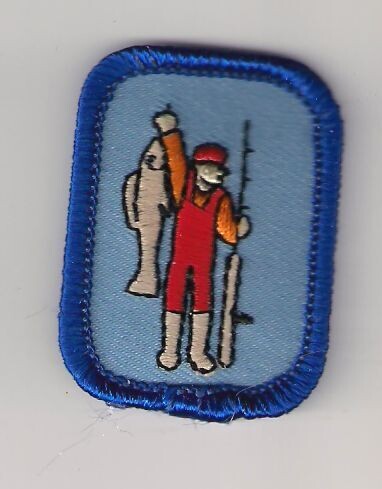Fishing GSCSNJ Council own IP (Original)
Skill Builders
1. Learn and practice good outdoor manners while fishing. Fishing, as in other sports, has certain ethics to follow. Are you a good sportswoman? What characteristics make up a good sportswoman? Discuss and role-play the following attributes of being a good sport when fishing: good outdoor manners, ethical and unethical behavior, more understanding of the point of view of others.
2. Find out about injuries which might occur while fishing. Show first aid for these injuries. Discuss the safety tips you would give to help prevent these injuries.
3. Know how to clean, store, and cook your fish. The methods used will depend on the species of fish and cooking techniques preferred by the angler.
4. Be prepared to survive if you get lost or stranded in the wilderness by knowing how to fish for food. Research what you would need and then make your own survival fishing kit.
5. Learn and practice the importance of "Leave No Trace" while fishing and discuss how it positively affects fishing resources.
Technology
1. Know the fishing rules and regulations for your state. Know your limits, seasons, permits, and other regulations to be lawful citizens while fishing in your state and know why there are laws to protect natural resources. Discuss the importance of reporting wildlife violations and learn the proper procedure of reporting accident.
2. Learn the different types of rods, lines, reels, and tackle boxes to use in various freshwater fishing. Discover the other tackle equipment that could be used such as nets, stringers, and hand tools.
3. Learn the importance of proper selection, as well as proper usage and care of your live bait while "still fishing". Practice the proper techniques to bait your hook while learning the difference between "tight line" and "bobber fishing". Make a booklet or chart of the different kinds of live or natural bait and show methods of hooking your bait. Include the information when and for what fish that specific bait is used.
4. On a map, locate ponds, streams, fish farms, and recreational areas that are accessible in your area for fishing. Find out about the different skills needed in locating your fish: basic needs of the fish, reading water, setting the hook, playing a fish, landing a fish, releasing a fish, and stringing the fish. Go fishing in at least two of the habitats listed above.
5. Research the different categories of artificial lures and bait. Make two different types of artificial lures and use them. Make a booklet or chart of the different kinds of artificial lures and bait and show the methods of hooking your bait. Include in the information when and for what fish that specific bait is used.
6. Make a record of the species of fish in your area. Learn to recognize at least ten species of freshwater fish by studying the anatomy and the habits of each fish. Read about the "food chain" process and discuss with a group how this process affects these ten species.
Service Projects
1. Put together a booklet or chart which includes the following: state rules and regulations, ethics, ten species of fish in your area and their habitats, natural and artificial bait selection.
2. Help a group of younger children get started in the art of fishing. Show them basic techniques and take them to a safe fishing area, following regulations in Safety-Wise.
Career Exploration
1. Find out where the fish hatcheries are in your area. Visit and find out about careers in that industry. What education is needed to fulfill the requirements to work at a hatchery?
2. In order to fish you need certain equipment for each type of fishing. Find out about careers attached to fishing equipment. What education do you need and what qualifications are needed?
3. Stocking a fishing area is a business. Find out what regulations are involved, what education you need and what careers are available in the stocking business?
4. Find out about the career opportunities of a Professional Fisherman. How do you go about becoming a professional fisherman?
5. Invent a career geared around fishing? What qualifications, education and other requirements would you need to succeed in that career?
